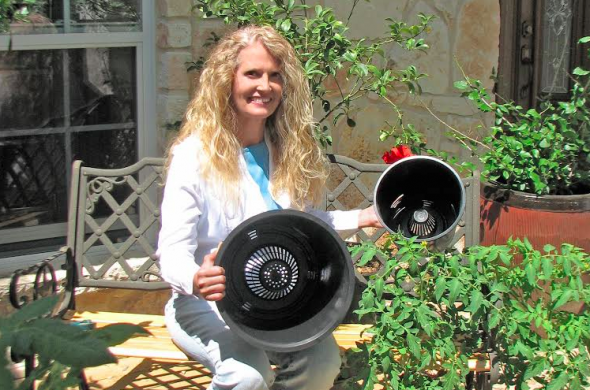How far would you go for a great tomato? Taunya brilliantly turns the question around in order to see how close to home we can grow the best tomatoes. She started the Plant Warrior Company to offer the average person an opportunity to recreate summer in a miniature ecosystem. Yes, we've probably all heard of container gardens, but you may not have heard Taunya expound on just how much they are capable of.
When did you know you wanted to work in food?
Living in Seattle, Washington, one block from the year-around high-stall Pike Place Market, I found a nexus of artisans, fishmongers, cheese and wine shops, and local farmers that changed my concept of fresh food forever. Even as the days and years passed by, the farmers were always there for me-but I began to take them for granted. Ho-hum. Should I begin tonight's dinner with?a wild caprese salad with Green Zebra and KBX yellow heirlooms or a tossed Almond Mandarin with fresh greens? Then my boss transferred me and in a click of my heels, it was all gone and suddenly I was on my own. My cravings for Pike's Market fare (You're not in Seattle anymore, Taunya) turned into a vision of responsibility to grow as much as my own food as possible.
How did you get your current good food job?
There is this moment when you realize your caprese salad tastes like cardboard and you wonder, "What's really in my tomatoes?" Well, as it turns out, not much. No taste and hardly any vitamins or minerals. Why? Because its a hybrid-mix pumped with chemical fertilizers, showered in pesticides, picked green, gas-ripened, and-to survive thousands of miles of shipping-it's bred for tough, thick skin.
Once I studied this University of Texas report and discovered that many modern vegetables also lacked sufficient nutrition for good health, I became a container garden devotee. Unfortunately, that did not work out so well.
After extensive testing, I discovered that most vegetables, and tomatoes in particular, really struggle in enclosed containers. Containers restrict gas diffusion (oxygen) and this hypoxic soil zone, often water saturated, fosters fermentation of bacteria that destroys plant roots. Armed with good research and science, I began to manufacture containers with an internal aeration chamber that promotes a healthy root system, increased plant health, and higher fruit yields. I still miss Pike Place Market, but my new job at The Plant Warrior Company and my Victory Garden make it much easier.
How did your previous work or life experience prepare you for a good food job?
Having grown up on a small farm in Utah, there is no childhood memory that does not include dogs, cats, rabbits, cows, horses and Grandpa's garden. Whether playing in the summer creek, sledding in winter, planting in the spring and the fall harvest, the laughter filling the air was from?a puppy with his nose stuck in a Halloween pumpkin; or a kitten pouncing hopelessly after Monarch butterflies; a horse nuzzling for more carrots or from the silly dance of a frisky newborn calf.
But the most cherished moment was when my cousins and I would sneak into Grandpa's garden and snatch vine-ripened tomatoes?add a dash of pepper and salt, and that was lunch alfresco. Gardening was a family affair and it made my decision to improve container gardening.
What was the greatest obstacle you had to overcome in pursuing your Good Food Job dream?
Although container gardens make up fifty percent of all home gardens, there is a service chain breakdown of best solutions for container soil, heirloom plants, organic fertilizers, pest control, and water management. So, starting in 2015 when customers purchase the Plant Warrior, I'm including tips and local sources to help the gardener maximize success. And, I welcome inquiries on which varietals do best by temperate zone and how to source the best heirloom seeds for the healthiest specimens.
What can you identify as the greatest opportunities in food right now?
It is well known that U. S. farmers switched from heirloom seeds to hybrid varietals in the mid-1950's to meet consumer demand. Hybrids offer the advantage of disease resistance, faster growth, and higher yields. All of these benefits are critical to the success of farmers. However, missing from the equation is "local", "flavor", "nutrients", and the "small farmer care for the land".
The sustainability solution is production-growing facilities such as Controlled Environment Agriculture (CEA) and Modified Environment Agriculture (MEA) greenhouses. Controlled or modified greenhouses offer higher and more consistent yields per acre; they provide protection from adverse weather conditions; the greenhouse design helps limit damaging pests, which eliminates the need for non-organic pesticides; and the greenhouses extend the growing season enabling continuous crop harvests of Heirloom varietals - grown best, of course, in the Plant Warrior.
If you could be compensated for your work with something other than money, what would it be?
Joy. Bringing container gardening to our school system, K-12. Imagine students growing their own lunch menu and mastering horticulture at the same time! My role would be to write the curricula starting with herbs for kindergarten, and advancing to high-value vegetables throughout junior high. For high school, we teach students how to select cultivars for nutrient content and give hands-on experience on how to engineer the environment to favor each variety.









